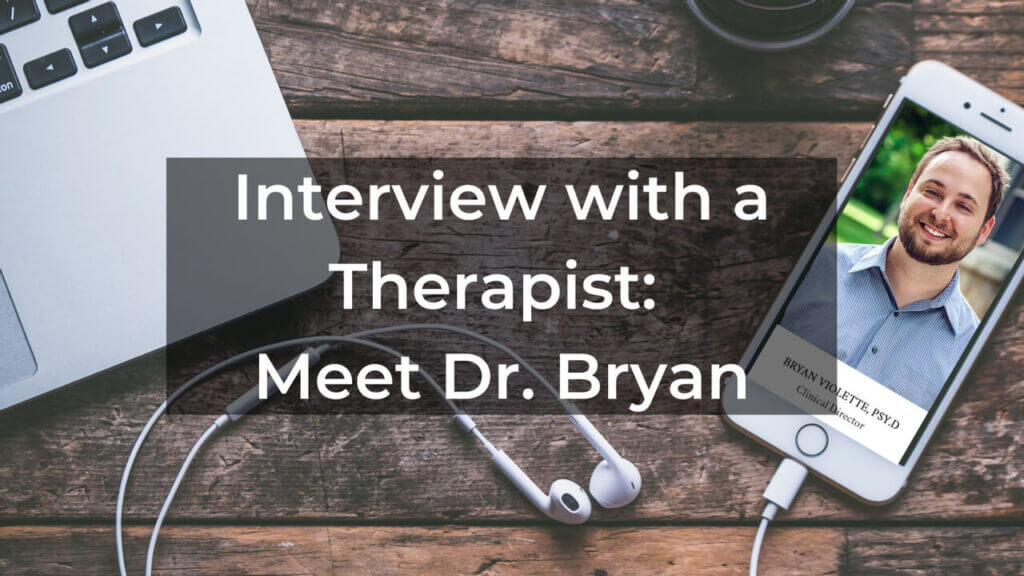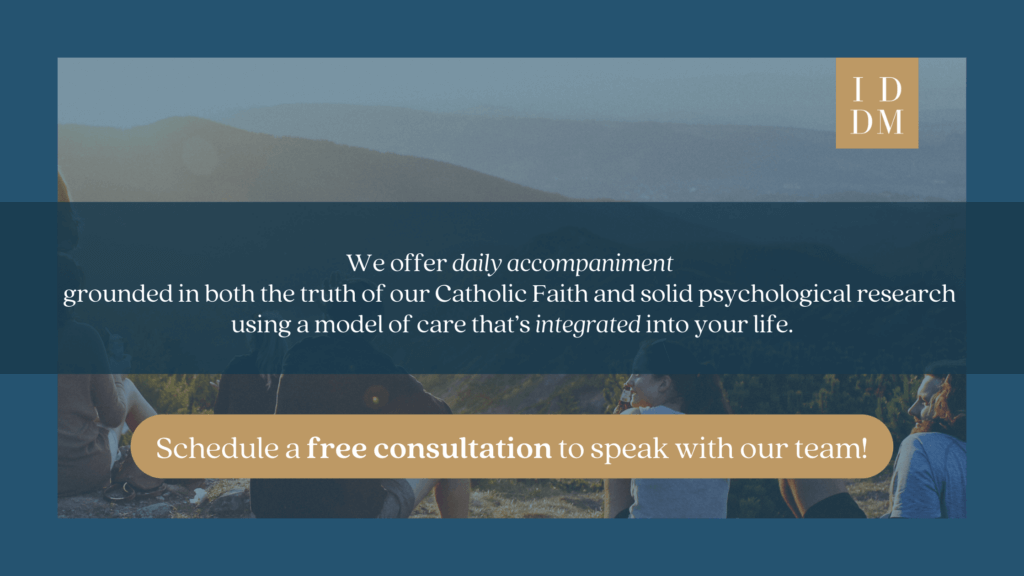
In this interview with a therapist, get to know Dr. Bryan Violette!
This month has been designated as Mental Health Awareness month. During May, I’ve decided to shine a light on various common mental health issues in the upcoming Being Human podcast episodes.
But as we’re focusing on bringing awareness to mental health, I think it’s also a great time to introduce more of the amazing professionals who serve as CatholicPsych Institute clinicians and IDDM mentors in order to highlight those who are available to help all who struggle with mental health issues.
This week I’d like to introduce CatholicPsych Institute’s Clinical Director and one of the founding mentors of IDDM, Dr. Bryan Violette. As Clinical Director, Dr. Bryan helps to train and supervise all of our therapists and mentors. Coincidentally, Dr. Bryan and I both grew up – and currently live – in Connecticut, we were both born and raised in Italian families, and we both attended graduate school at the Institute for the Psychological Sciences (currently called Divine Mercy University or DMU) where we first connected with one another.
Dr. Bryan is married to Teresa Violette (a fellow CPI clinician and IDDM mentor as well) and together they have a young son. Dr. Bryan has been working at CPI for the past six years.
Transcript of a brief Q & A Interview with Dr. Bryan Violette
Dr. Bryan, what drew you to the field of mental health?
As an undergraduate I studied history and was very fascinated by discerning patterns, which I think lent itself later in my diagnostic formulations in trying to understand patterns in people. So what began in the abstract in history I was later able to use to apply to my clinical work.
While an undergraduate, I had a conversion of heart and after finishing up, began studying moral theology in graduate school. Soon after, I realized I was not as interested in the theoretical as much as in learning how to apply knowledge, and my main interest was to use the gifts God gave me to serve others. This realization led me to pursue higher education at the Institute for the Psychological Sciences (currently DMU) and had the great privilege there of learning how to integrate Catholic anthropology with the science of psychology.
I’ve always had a sensitivity to mental health issues due to mental health challenges in my immediate family growing up that created openness to psychological questions. This experience also helped me develop compassion for those struggling with mental health issues. When I started to learn more about my faith, I found it easy to see the overlap between the spiritual life and the psychological life and I became really excited about the possibility of exploring the interplay between those two fields of knowledge in order to help people.
What do you love most about your work?
It’s a tie honestly. I really love advancing knowledge and exploring theoretical concepts with other members of the CPI staff in order to contribute to thought progression and research in the field. But I also really like working with people one-on-one, whether that’s helping clients directly through individual care, or through my role as clinical director and supervisor training other people to do the same.
I’m very interested in the art of psychotherapy and how applied theoretical knowledge embedded in psychological theory can be communicated through a relationship, and I love cultivating and helping develop that skill set in other clinicians.
You’ve been with CatholicPsych Institute (CPI) since 2015. What has been unique for you in working here?
Working at CPI has given me the opportunity to practice from an explicitly Catholic perspective. Underneath any science is some kind of philosophy of the human person. What’s great about CPI is that we are upfront in making it known that our presuppositions are Catholic. (A lot of times other clinical practices don’t articulate their presuppositions for determining how they might guide or direct the process of healing.)
At CPI, we’re utilizing the treasury of teachings of the Catholic Church to inform how we look at the human person. We’re drawing from the giants of theological thought and the great spiritual masters, and find psychology embedded in their worldview or thought. And then I have the unique opportunity to apply all of that directly to the psychological sciences in order to help people.
What do you wish more people understood? What do you want to “shout from the rooftops” about mental health?
I think it would be that you cannot earn love and that it is a gift. So many people today unconsciously try to earn love through a myriad of ways – earning money, increasing competency, obtaining success, etc. Real love is not conditional. God loves you. You don’t need to earn His love, and there is no transgression that you can commit that would make you fall outside the bounds of His love for you. I want people to really understand that: you cannot earn love. It is a gift.
What would you tell someone who is hesitant to enter therapy?
Everyone can benefit from therapy. At the end of the day, we all need help! We’re relational and social beings and we are made in the image of God who reveals Himself as a family – as three persons – and we participate in that. I believe a lot of lies happen in the psyche that tell us being vulnerable will result in rejection and criticism, but I would encourage people to step outside of those lies and learn how others want to help – and CAN help.
This week on the podcast I’m discussing Narcissistic Personality Disorder (NPD). Have you ever worked with clients who have NPD and/or do you have any insight for those who have NPD or have someone in their lives with it?
I’ve worked with quite a few clients who have NPD. Oftentimes people with this disorder may not feel a need to change until something happens that challenges or threatens the system of defenses they have developed. Many people who have NPD can be quite successful in their careers as they are often decisive, appear to be confident, and can give the impression of being really competent in the workplace. But the skills that work in the work-world don’t work at home, so their marriage or social life/social functioning and friendships may be in devastation.
When there’s an incongruence between the environment and the self, then tension exists and difficulties with mood develop such as anxiety or depression. That’s usually when we see those with NPD. It can be very challenging to help people see there are layers of defenses preventing them from accessing that they are in a lot of pain.
Interactions with someone who struggles with narcissism can be very frustrating and painful. I’ve found that it can be helpful to remember that deep down, however that person’s defenses are treating you, it’s infinitely worse within themselves in how they relate to themselves. People who have NPD are usually in a tremendous amount of pain underneath all the layers of egocentrism.
Stay tuned for more interviews this month, and be sure to listen in to the latest episode of the podcast for more information on Narcissistic Personality Disorder.
Know someone struggling with mental health issues? Feeling a need for help and healing in your own life? Contact us, we offer 30 min consultations.
I’ve launched a new program to walk with people daily in their lives. You can learn more about Integrated Daily Dialogic Mentorship (IDDM) here.

If you enjoyed this interview check these other related posts:

